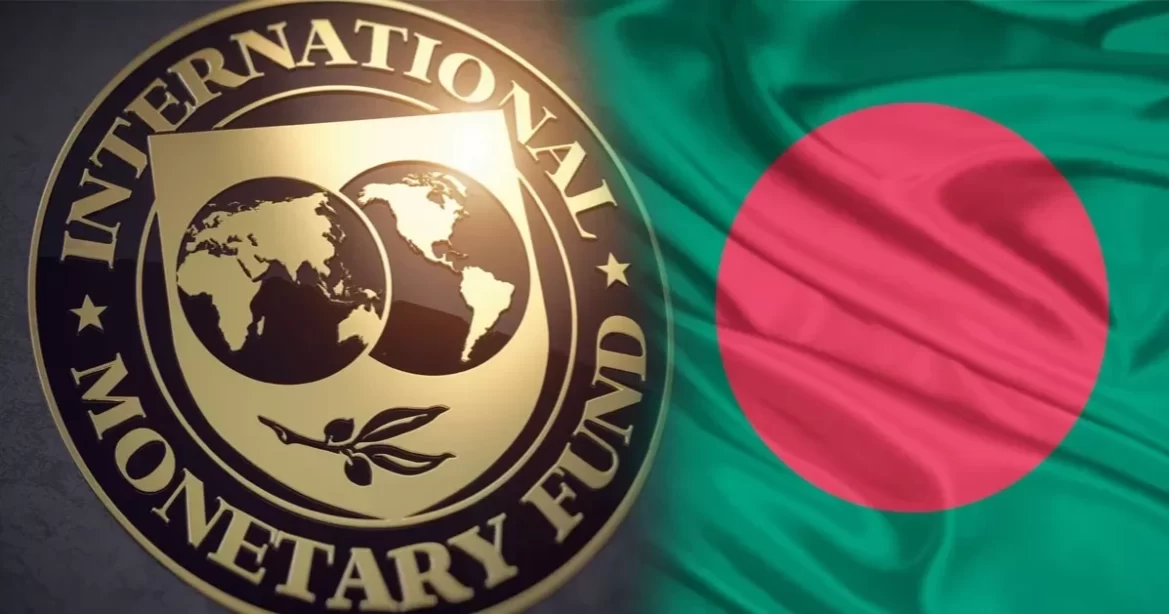The International Monetary Fund (IMF) has disbursed the first tranche of a $476 million loan, out of $4.1 billion package, to Bangladesh, with the country’s tax-to-GDP ratio cited as one of the lowest in the world. To attain this loan, the government has committed to implementing approximately 45 conditions over the next 42 months under the IMF loan program, with the goal of increasing net international reserves, adopting sustainable public procurement policies, and including climate and green dimensions in the associated action plan.
You Can Also Read: HOW IMF’S CONDITIONS ARE AFFECTING THE MIDDLE AND LOWER CLASS PEOPLE?
Considering these facts, the loan package of IMF for Bangladesh will have a significant impact on the country’s national budget for FY24 as the organisation’s conditions are significant enough to put its mark anywhere. Among these conditions the government will have to increase the prices of petroleum products, which has already been done to some extent, in order to comply with the IMF’s conditions.
What are the conditions?
As part of the first review of the loan package, the IMF is urging the central bank to include rescheduled loans of the country’s banks alongside non-performing loans in the Annual Financial Stability Report. Additionally, the IMF is calling for the Bank Company (Amendment) Act and the Finance Company Act to be submitted to parliament by September 2023. In the third review, scheduled for FY24, the Bangladesh Bank will be expected to publish banks’ distressed assets in line with Basel III standards.
Finance Division officials have indicated that the government is expected to prepare a Tk 7.5 lakh crore national budget for the upcoming financial year. The overall revenue collection for the new financial year may be fixed at Tk 4.8 lakh crore, which would require the government to borrow around Tk 2.6 lakh crore mainly from local sources to meet the deficit.
GDP growth to be ensured along with keeping inflation low
The Ministry of Finance has identified seven priorities for the fiscal 2023-24 budget to maintain GDP growth and low inflation, according to a draft prepared by the ministry. The seven priorities include ensuring a strong supply chain for maximum GDP growth, addressing high imported inflation, expanding social safety net programs, subsidizing electricity, gas, and agriculture due to global fuel and fertilizer price hikes and exchange rate slumps.
Additionally, the priorities include continuing subsidies on fertilizer and mechanising agriculture, promoting human resource development and employment generation, and rural development. Finance ministry officials involved in the proceedings note that the government is also mindful of the IMF’s budget-related conditions. Ramping up revenue collection is one of the major IMF loan program conditions, with a tax-revenue collection target of Tk 143,640 crore for the July-December period. The government is also preparing for the upcoming election while taking these factors into account, which will be a major point to be noted for the upcoming budget.
Government aims to increase revenue collection and reduce subsidies
The IMF has also set a budget deficit ceiling of Tk 114,110 crore for the first six months of the fiscal year, and the government has set a budget deficit target of Tk 264,193 crore for the year, keeping in mind the IMF threshold. In addition to this, the government is planning to reduce subsidies in different sectors, including power and energy, increase revenue collection through reform measures, and focus more on social spending on health and education, in accordance with other IMF conditions.
The proposed budget for the next fiscal year is likely to be Tk 750,165 crore, up from the current year’s Tk 678,063 crore, with a Tk 265,000 crore allocation for the annual development programme. The total revenue collection target for the upcoming fiscal year is Tk 486,000 crore, an increase from this fiscal year’s Tk 433,000 crore. The government has set a goal to achieve a 7.5 percent GDP growth and maintain inflation within 6 percent.
What are experts saying?
In a recent statement, Shamsul Alam, the state minister for planning, stated that,
The International Monetary Fund (IMF) did not impose any conditions on the government of Bangladesh, but only provided suggestions.
He mentioned that the government’s priority is to keep the budget deficit within limit and tackle inflation. The government plans to provide necessary budget support to increase agricultural production and maintain supply.
According to Mustafizur Rahman, a distinguished fellow of the Centre for Policy Dialogue, the government should consider the IMF’s suggestions to increase revenue collection as it would enhance fiscal space. Rahman added that the government should avoid implementing any populist measure with the upcoming election in mind, which could negatively impact the economy. Shamsul Alam clarified that the budget would not be election-focused and that the government plans to showcase its accomplishments from the last four and a half years to voters.
Ahsan H Mansur, Executive Director of the Policy Research Institute, has indicated that the country’s low tax base is hindering critical government spending on health, education, and human development, and that increased revenue generation would help to curb the growing budget deficit.
Despite the program’s full implementation, there are still risks to the outlook. The failure to effectively address banking system problems, such as high non-performing loans, is a medium-risk issue that could have a medium-to-high impact in the short-to-medium term. While the IMF has suggested structural benchmarks for the banking sector, they appear to be rather tepid when juxtaposed against the risks from the sector. The lack of more stringent mitigation measures is a matter of concern.


